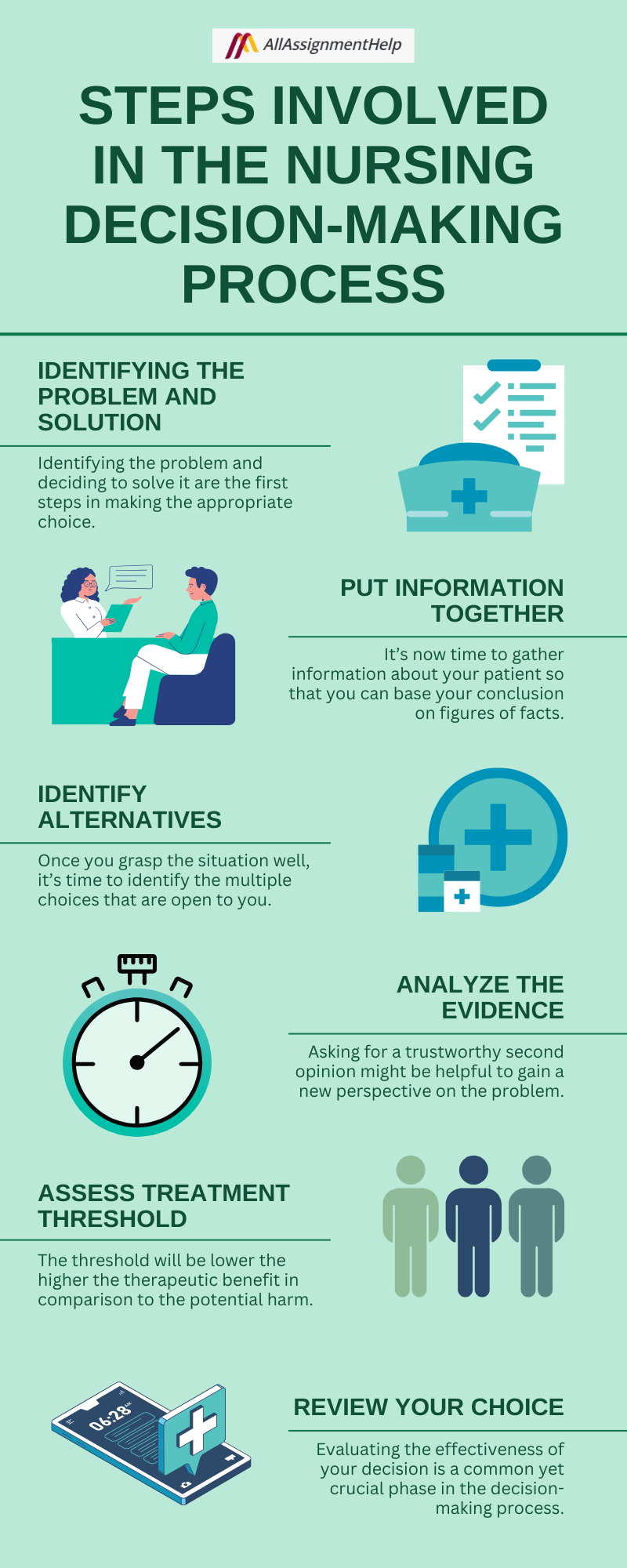Table of Contents
Decision-making is an important component of professional nursing practice. It directly impacts safety, patient outcomes, and the general standard of care. In associate professional nursing roles, making informed, timely, and ethical nursing decision-making becomes essential. These decisions vary from standard clinical judgments to more intricate ones, including patient advocacy, ethical dilemmas, and multidisciplinary cooperation. This shows how important it is to incorporate decision-making into the courses for nursing students. After all, effective decision-making is at the heart of quality patient care. So, let’s explore the science of nursing decision-making that professional nursing associates do on the job. Keep reading this blog created by All Assignment Help to understand the key aspects of the decision-making process in associate nursing practice.
What Is Nursing Decision-Making?
Nursing decision-making is a complex process that consists of a series of choices, including gathering both objective and subjective information about a patient’s state while assessing that information to implement actions to achieve the intended result.
Every nurse working in a medical environment needs to be capable of making clinical decisions. Quick decision-making and critical thinking in nursing are necessary, depending on the circumstances. There can be serious repercussions if a nurse is unable to decide how to care for a patient.
Besides, students taking nursing courses need to understand nursing ethics first to make legal and appropriate decisions in practice. However, learning ethical principles in one go can be complicated. Students can develop a detailed understanding of nursing decision-making ethics under the guidance of a nursing assignment help expert. An expert can assist you in grasping all facets of nursing practice decision-making in an easy-to-understand manner by simplifying tricky concepts.
Read Here: Is Nursing an Ideal Profession for You?
Importance of Decision Making in Nursing
Nursing decision-making is important because nurses often work on the front lines of patient care, where prompt, ethical decisions can have a direct effect on patient outcomes. Here are some key points explaining why decision-making is important in nursing:
- Ensures Patient Safety: Nurses have to make decisions about the administration of medications, keeping an eye on vital signs, and handling crises. Making informed choices helps avoid mistakes and problems. This guarantees that patients receive safe and efficient treatment.
- Enhances Care Quality: Nurses can modify treatment plans to meet the requirements of each patient by applying clinical judgment and critical thinking. Improved decision-making results in more successful therapies and happier patients.
- Allows Prompt Actions: Usually, nurses pick up on little changes in a patient’s condition before anybody else. Making quick, evidence-based decisions enables prompt treatments, which could prevenNursing decision-making is important because nurses often work on the front lines of patient care, where prompt, ethical decisions can have a direct effect on patient outcomes.
- Managing Complicated Circumstances: Patients often suffer from multiple medical conditions. Nurses can successfully prioritize care and handle the complexity by using ethical decision-making in nursing practice.
There are several introductory courses available online that teach students the basics of nursing decision-making. These courses are ideal for those who want to gain an overview of the decision-making process in associate nursing programs. However, some students might find online classes challenging due to time constraints or complex material, and come up with a thought like, is there anyone who can take my online nursing class for me and help me get out of the problem? For such students, there are online class help services available that offer affordable assistance to students. These services possess a team of nursing professionals who are experienced in handling online classes for students.
Key Models and Theories in Nursing Decision-Making
Several theories and models help in nursing decision-making. They assist nurses in making accurate decisions on patient care, whether those decisions are based on intuition, reasoning, or a mix of the two. Some of the key models and theories used in nursing decision-making are:
Rational Model
This method values evidence-based decision-making, analyzing data methodically to identify the best course of action. Moreover, this model allows for the application of methods such as decision trees, Pareto analysis, and SWOT analysis.
Bounded Rationality
This model highlights that decision-makers often lack time and information, so they might settle for what is “good enough” rather than aiming for the best result.
Hypothetico-Deductive Model
This model integrates both intuitive and logical thinking. A hypothesis is developed based on the assessment of the patient, then it is subsequently put to the test via observation and additional research.
Cognitive Continuum Theory
According to this theory, which was put up by Hammond, decision-making can be anything from highly analytical and systematic to more intuitive and unstructured.
Middle-range Theory
This theory is more focused and addresses a single facet of nursing practice, such as Benner’s Novice to Expert Model.
Micro-range Theory
This theory is the most precise and is often used in clinical practice to guide therapies in certain circumstances.
Clinical decision-making is grounded in nursing theories and models. Nursing research and conceptual blueprints are shaped by these theoretical models, which ultimately establish the how and why of nurse-patient interactions.
Steps Involved in the Nursing Decision-Making Process
Nursing decision-making involves incorporating good clinical judgment, patient preferences, and accessible resources for making accurate and evidence-based decisions. The process of ethical decision making in nursing practice is intricate and includes multiple steps:

Identifying the Problem and Solution
Identifying the problem and deciding to solve it are the first steps in making the appropriate choice. The patient’s symptoms, medical history, and other factors are used to estimate the probabilities. What is the likelihood of a particular diagnosis? Establish the benefits that this choice will provide for your patients.
Put Information Together
It’s now time to gather information about your patient so that you can base your conclusion on figures of facts. This requires making a value assessment, deciding which data to utilize, and determining how to get it. At this stage, you need to be quite attentive as a single missing information can ruin your final decision-making. Hence, it is best to get assignment help online for additional assistance. This will help you stay on track with the right information.
Identify Alternatives
Once you grasp the situation well, it’s time to identify the multiple choices that are open to you. You likely have a lot of alternatives to pick from while making a decision. Hence, it is crucial to generate a range of options. This assists you in choosing the best course of action to treat your patient.
Analyze The Evidence
You must be able to analyze the advantages and disadvantages before choosing the course of action with the best possibility of success. Asking for a trustworthy second opinion might be helpful to gain a new perspective on the problem.
Assess Treatment Threshold
The threshold will be lower the higher the therapeutic benefit in comparison to the potential harm. Consider other possibilities, such as obtaining more information or keeping vigil. You need to consider them if you lack the knowledge necessary to convince yourself to overcome the problem.
Review Your Choice
Evaluating the effectiveness of your decision is a common yet crucial phase in the decision-making process. Consider your accomplishments and what you can do better the next time.
These are steps that should be included while making a decision. They help them make the correct decision. No matter whether you are asked to write a medical-surgical nursing assignment, a Pediatric nursing assignment, a public health nursing assignment, or any other, you need to follow the right step process to come to an appropriate decision-making. However, you should also read the assignment instructions first to plan your further decision-making process.
Key Factors Influencing Nursing Decision-Making
The decision-making in nursing practice is influenced by many factors. These are some of the most important ones:
Patient Care Requirements
By gathering information, comprehensively skilled nurses can rapidly identify the patient’s requirements and reduce the number of potential medical problems the patient may be experiencing.
Building Relationships with Patients
Building relationships is important because it facilitates patient confidence and trust, which highlights the significance of nurse practitioners. Nurses put the health and general well-being of their patients first in their everyday work. The role includes various responsibilities in including sickness prevention, health promotion, education, and counseling.
Patient Assessment
Patient assessment is the process of identifying a patient’s condition, requirements, capabilities, and preferences. Most assessment tests are administered by nurses, although they can also be conducted by emergency medical personnel, physicians, or other qualified medical personnel.
Possible Risks
Experienced nurses can use their background and expertise to consider the wider picture of patient care and anticipate unforeseen circumstances.
Workload Management
Skilled nurses can prioritize and list their care chores according to the demands of their patients. Accordingly, the significance of tasks and data helps nurses to keep all serious information, which increases the effectiveness of how they make decisions.
Several factors influence nursing decision-making, such as patient requirements, available resources, clinical judgment, evidence-based practice, patient preferences, ethical concerns, and multidisciplinary teamwork. Nursing associates need to be aware of these factors to deliver safe, efficient, patient-centered care.
Also Read: Master of Nursing: A Way to Skyrocket Your Nursing Career
Conclusion
Decision-making is a key component of nursing practice that requires a combination of critical thinking skills, experience, and knowledge. Nursing students can make sure they are making informed, evidence-based decisions that support favorable patient outcomes by following a methodical procedure and using effective techniques. However, if you have difficulties while pursuing nursing, you can get our help. We offer the best nursing assignment help to students who cannot cope with the assignments and study together. Also, if you are enrolled in an online nursing program and feel less prepared for your online exams, you can ask us to take your online exam on your behalf. We have nursing professionals who are familiar with the online exam-taking process and help you score the best in your online nursing program.
FAQs
How does the decision-making model work in nursing?
The nursing process consists of five logical stages that serve as a methodical guide to client-centered care. These include diagnosis, evaluation, planning, execution, and assessment.
What are the advantages of nursing decision-making?
Nursing decision-making improves patient care by enabling timely and accurate interventions. It enhances clinical efficiency and boosts nurses’ confidence and autonomy. Effective decision-making also promotes patient safety and better health outcomes.
What does nursing problem-solving include?
Nursing problem-solving is a systematic process that includes identification, analysis, and decision-making. It also involves implementing solutions and assessing their efficacy.
